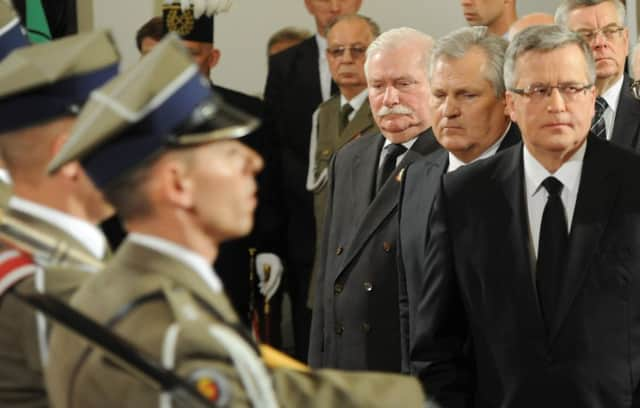Walesa: ‘I will leave God to judge Jaruzelski’


Where the general should be buried and who should attend was a source of deep controversy in Poland, with some criticsadvocating that the funeral be stripped of all the trappings of state generally granted to former presidents.
In the end Gen Jaruzelski, who died on Sunday aged 90, was granted a military funeral with religious rites. Despite being an unbeliever for most of his life the general had apparentlyundergone a deathbed conversion.
Advertisement
Hide AdAdvertisement
Hide Ad“I lost many battles with General Jaruzelski; I have many grudges but in the end I won the war. I can express my opinion and pass judgment but that is not the job of politicians,” said Mr Walesa about his old foe, who had him interned during martial law in 1981.
He added: “I leave God to pass final judgment on Wojciech Jaruzelski, because I do not know enough, and people had to make difficult decisions in a time of treason. It was also a period of unhappy times.”
But not all Poles were somagnanimous, with manyunable to forgive Gen Jaruzelski for martial law and the bloody crackdown on the Solidarity trade union, which at the time threatened the communist order.
Gen Jaruzelski went to his grave insisting that he had declared a state of emergency in order to forestall a Sovietinvasion which could haveresulted in a bloody confrontation, although historians dispute his version of events.
Poles also accused Gen Jaruzelski of involvement in a massacre of dozens of Gdansk shipyard workers in 1970 when he was defence minister.
Since he stepped down from office as president in 1990, the general had faced numerous attempts to have him prosecuted for his alleged crimes but had always managed, in the eyes of some, to evade justice.
His comfortable lifestyle in a smart Warsaw villa, financed by a generous pension, alsorankled with his former opponents, many of whom had to get by on a diminutive statepension.
A number of protesters at the funeral held signs calling the late general a “traitor” and shouting “Go back to Moscow!”
Advertisement
Hide AdAdvertisement
Hide AdOne held a large placard depicting a bottle of beer in an army uniform and Gen Jaruzelski’s trademark tinted glasses with theslogan “What makes a good party? A cold Wojciech.”
The funeral cortège, led by a soldier holding the general’s medals, had to pass through ranks of protesters who heckled and blew whistles to voice their anger.
In recognition of the darker aspects of the general’s career, his passing was not marked by a period of national mourning or a minute’s silence in the Polish parliament.
But, as evidence that Gen Jaruzelski still divides Poles in death as in life, supportersrallied to his graveside and even some of his harshest critics have credited him with playing apositive role in Poland’s peaceful and bloodless transition from communism to ademocratic state.
“He struggled with theburden of responsibility ofhaving to make some of the most difficult decisions ever made in post-war Polish history,” said Bronislaw Komorowski, the Polish president and a former Solidarity activist, during a speech at the funeral.
“Let him rest in peace inPoland.”
Mr Komorowski and Mr Walesa did not attend theburial ceremony of the general’scremated remains.
Monika Jaruzelska, thegeneral’s daughter, praised the decision to let her father beburied in a military cemetery, saying that he “saw himself as a soldier and always wanted to be buried alongside his comrades in arms”.